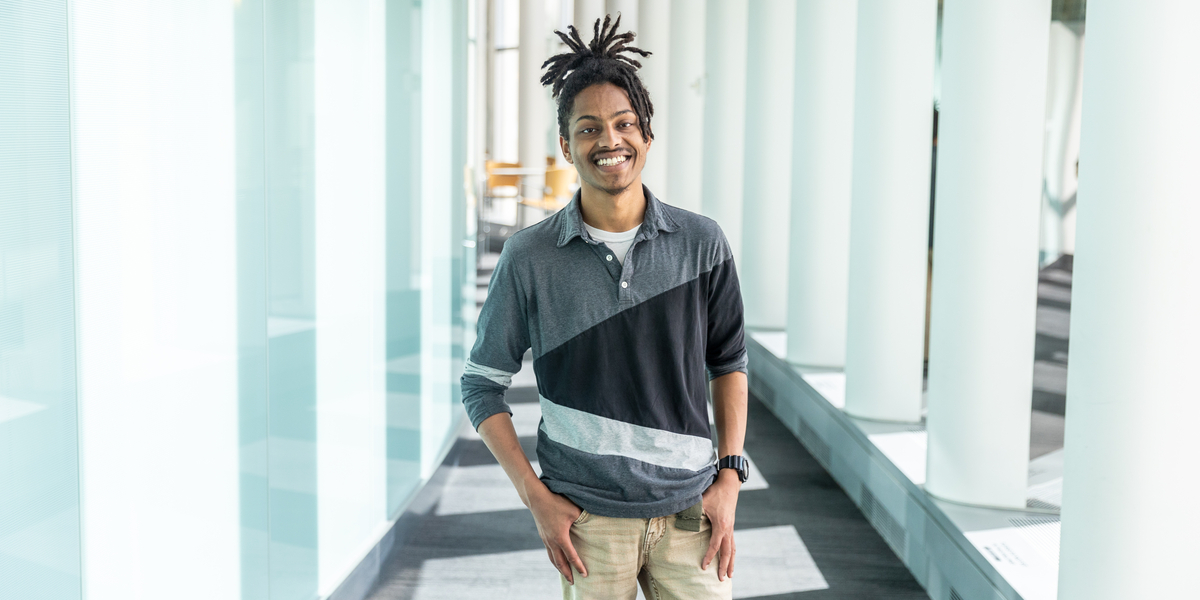
On a small table in Azion White’s kitchen, there’s a shaking incubator for cell culturing. In his living room, you’ll find two 3D printers and a genetically-engineered tomato plant. Beside his computer in the bedroom, there’s a PCR machine, a homemade bioprinter, and a dry bath incubator for studying and replicating DNA.
While his interior decor isn’t something from your typical IKEA spread, White (B.S. Biochemistry, ’21) feels right at home in the Bay Area. Shortly after earning his degree, he landed a job with BluumBio, a startup with UC-Berkeley roots. As a synthetic biologist, White helps develop bioremediation technologies that rapidly clean soil, air, and water.
When he isn’t working his day job, he’s focused on getting his own startup company, Ourogami, off the ground. Using the power of synthetic biology, Ourogami aims to “upcycle” common plastics like PET into building materials, medicine, and other target compounds. Ultimately, this business model promotes a circular economy—one that uses products to their fullest potential and reduces waste to a minimum.
White co-founded Ourogami with his childhood friend and fellow alum, Kovic Odhiambo (B.A. Statistics,’21), during his senior year at the University. White was planning to do postgraduate research at Northwestern University, but COVID-19 put a damper on things. Like all good founders, he pivoted accordingly. With some funding from the Carlson School and the Acara Challenge—along with his own hard-earned money—he built his own research lab at home.
“I wanted to have a project and business idea to keep working on,” says White. “At the time, I was playing with 3D printing, and I thought it would be so convenient to recycle the plastic waste that I was getting from those, by designing organisms that could ‘eat’ plastic and turn it into useful things.”
Along with plastics recycling, White hopes to incorporate 3D bioprinting into his business portfolio. This evolving field uses cells and biomaterials to create functional tissues. “There are tons of awesome ideas coming into the 3D bioprinting manufacturing space, not just for the biomedical industry, but for making new and affordable products such as electronics.”
White’s interests are a great fit for BluumBio, where he’s working to speed up natural processes that break down microplastics, heavy metals, and other contaminants. He’s currently a full-time employee with the company, but in the next year or two, he hopes to relaunch Ourogami as his sole venture, through funding from an accelerator program like Y Combinator.
White’s fascination with biochemistry started around seventh grade, in his hometown of Brooklyn Park, Minn. Back then, he was teaching himself how to code so he could make his own video games. One day, a genetic engineer visited his science class and brought along some glow-in-the-dark bacteria cells. “After class, I talked with the scientist and told him I was interested in computer programming. He made the analogy that DNA code is to an organism as computer code is to a PC. That just blew my mind.”
Fast forward to his junior year in college—and White was using cutting-edge synthetic and structural biology techniques in the University’s BioTechnology Institute. As a research associate for the Schmidt-Dannert Lab, he characterized and assembled a toolbox of biocatalysts for chemical manufacturing. He also helped develop biodegradable nano-surface coatings for the manufacturing of biomaterials.
White says the College’s emphasis on undergraduate research was vital to finding his niche. “The world of bioengineering is what I was looking for, but I didn’t know exactly what it was or where to look. I’m very grateful to CBS for helping me make that connection.”—Eve Daniels